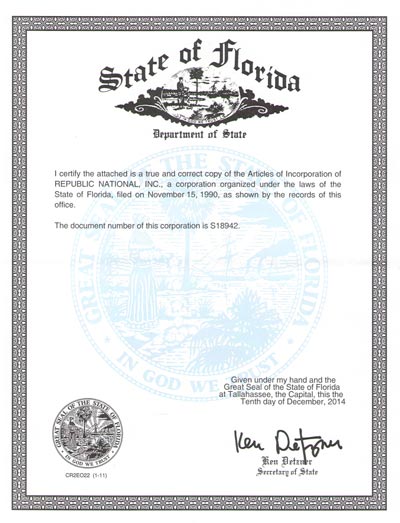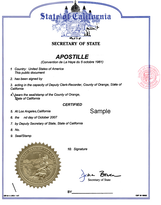Understanding the Apostille Process: A Comprehensive Guide to International Record Verification
Browsing the complex landscape of global document verification can be intimidating without a clear understanding of the apostille procedure. This guide thoroughly outlines the required actions, from determining which files require qualification to submitting them for verification by the Competent Authority. Comprehending the significance of an apostille and identifying possible risks, such as incomplete entries and language barriers, can significantly simplify the authentication journey. What precisely specifies an apostille, and why is it so essential for files predestined for Hague Convention countries? These concerns develop the structure of our exploration into this essential legal treatment.
What Is an Apostille?
An apostille is a main certification that confirms the authenticity of a file for use in another nation. This certification, provided by a designated authority in the nation where the record stemmed, ensures that the record is acknowledged as valid and reputable in the worldwide arena. The process of acquiring an apostille includes numerous steps, including the confirmation of the document's trademarks, seals, and stamps by ideal governmental bodies.
The apostille offers as an internationally acknowledged form of authentication, made possible by the Hague Convention of 1961. This treaty, officially called the Hague Convention Abolishing the Need of Legalisation for Foreign Public Papers, standardizes the process of file qualification among member countries. The apostille itself is a standardized certification that includes particular details, such as the releasing authority, the native land, and the date of issuance.
It is necessary to keep in mind that not all files are eligible for an apostille. Normally, public documents like copyright, marital relationship licenses, court orders, and instructional diplomas get approved for this qualification. Personal files, such as agreements and arrangements, may need registration and additional actions to certify.
Importance of Apostille
Recognizing what an apostille is sets the stage for appreciating its importance in global negotiations. houston tx apostille. An apostille, essentially a kind of certification provided by a marked authority, confirms the credibility of a document for use in foreign countries that are notaries to the Hague Apostille Convention. This standard procedure gets rid of the requirement for additional legalisation by consular offices or consulates, thus enhancing international transactions
It ensures the integrity and approval of vital documents-- such as copyright, marital relationship licenses, and educational diplomas-- across boundaries. For businesses, it facilitates the smooth conduct of global profession, mergers, and procurements by giving a trusted method of document verification.
Moreover, an apostille enhances legal security and compliance. Governments and establishments can confidently depend on the authenticity of documents birthing an apostille, mitigating the danger of scams and misrepresentation.
Documents That Require Apostille
When participating in global deals or lawful issues, specific documents commonly require the authentication supplied by an apostille. This ensures their acknowledgment and approval in nations that are signatures to the Hague Apostille Convention. Typically, personal papers such as birth certifications, marriage certificates, and fatality certificates require an apostille, especially when they are made use of for procedures like immigration, marital relationship abroad, or global probate matters.
Educational files are an additional classification often calling for apostilles. Diplomas, transcripts, and academic records often require this authentication for functions such as seeking more education, employment, or expert licensing in an international country (houston tx apostille). This step guarantees that the records are recognized as legitimate and legitimate
Legal documents, including powers of lawyer, testimonies, and court orders, additionally click resources commonly demand apostilles. Service papers such as certificates of incorporation, bylaws, and commercial agreements might call for an apostille to facilitate worldwide trade, establish foreign branches, or engage in cross-border legal proceedings.
Steps to Acquire an Apostille

Getting an apostille involves a multi-step procedure that makes sure the authenticity and approval of your papers in international nations. The initial action is recognizing which papers need an apostille. houston tx apostille. Common records include birth certifications, marital relationship licenses, scholastic records, and corporate records
Once determined, the record view website must be certified by the suitable issuing authority. This may include notarization by a notary public or confirmation by a regional or state official, depending upon the kind of record. After certification, the paper needs to be submitted to the designated Competent Authority in the record's nation of beginning. In the United States, for instance, this is normally the Assistant of State's workplace for every state.
The submission procedure typically requires a finished application, the original paper, and a cost. Some jurisdictions may supply the option of expedited handling for an added cost. Upon effective confirmation, the Competent Authority will attach the apostille certification to the file, thus verifying its authenticity.
Common Difficulties and Solutions
Browsing the apostille procedure can offer numerous common difficulties that, if not their website correctly addressed, may postpone or complicate record authentication. Each nation has certain needs for the kinds of records that can be apostilled, and any type of inconsistency from these can result in denial.
An additional typical challenge is comprehending the varied processing times. Processing times can differ substantially in between countries and also between different regions within the exact same country. It is necessary to represent these variations when intending the apostille process to stay clear of unanticipated delays.
Furthermore, language barriers can pose significant challenges. Papers in an international language commonly call for licensed translations, and any errors in translation can bring about additional issues. Involving an expert translation service can mitigate this threat.

Conclusion
Grasping the apostille procedure substantially enhances the effectiveness of global document verification. By understanding the need of identifying and licensing required files, and browsing the submission to the Competent Authority, the process ends up being a lot more workable.